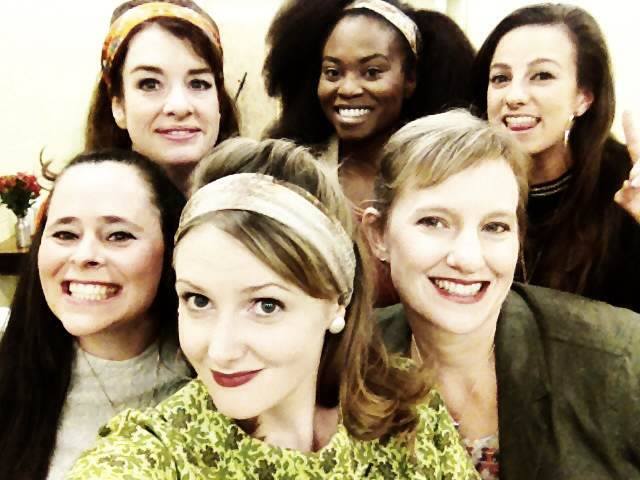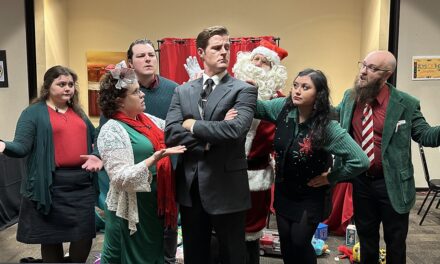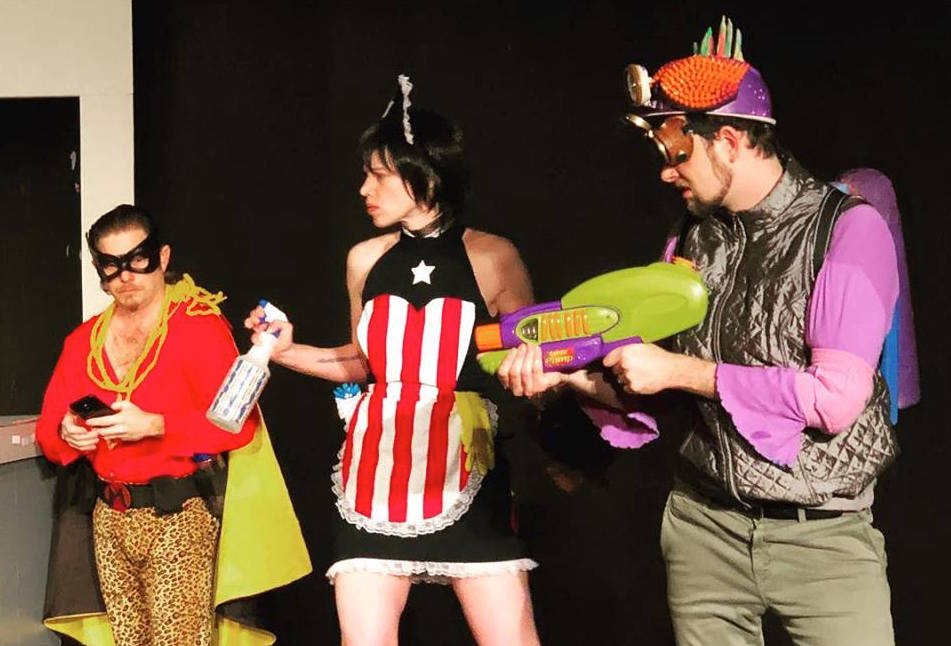(front) Trina Fischer, Laura-Ellis, Jennifer-Thalman-Kepler. (back) Karole Spangler, Ebony Nolan Jordan and Chelsea Skalski in Class of ’70. Photo – Looking for Lilith.
Class of ’70
Directed by Shannon Wooley Allison
Review by Keith Waits
Copyright 2013 by Keith Waits, all rights reserved.
Looking back to the 1960s has become such a common practice in popular culture; it’s a risky business. Cliches abound and the shorthand available from counter-culture tropes from that time is well-worn territory. Yet the temptation to dip once again into such a fertile period is difficult to deny.
Class of ’70 holds up well against such criticism for a couple of reasons. One, it is a retooling of one of the first shows Looking for Lilith developed some ten years ago (through a devising process that included many individuals); and, two, its salient themes are again relevant to a degree that might not have seemed possible a few years ago. If one assumes the inexorable progress of American society, then struggles for gender and racial equality should be discussions more appropriate for a history classroom. But recent events, as mentioned in director Shannon Wooley Allison’s program notes, prove otherwise. As we watch our civilization step backwards by disenfranchising minorities and women, perhaps revisiting the last time social activism dominated American lives has profound value.
Feminism is dominant, but the script also addresses the Black power movement and racial identity as well. It is structured episodically, with interview segments alternating with narrative scenes of a group of women. The interviews are often cued by audio clips from the original recorded oral documentation by the team who devised the first production. The transition to actors enacting the resulting stories is fairly smooth, and the ensemble is equally adept at moving from portraying one primary character to multiple supporting roles throughout.
As successful as the show is at cataloging its topics and at building a foundation of integrity in the storytelling, I could not help but feel that the docudrama structure somewhat undercuts the emotional impact and that the material never engages as much as you hope it will. It is not without wisdom in this regard, with notes of loss and triumph present in the thoughtful final moments that create a longing for a deeper connection to these characters.
The cast exemplify the idea of ensemble, which makes it all the more difficult to highlight individual work; but Ebony Jordan has a fine, understated power in the dual roles of Regina and her brother James. As we see Regina move from her brother’s shadow to find her own unique voice, her character becomes a summary snapshot of the American woman in the latter half of the 20th century and the heart of the evening. Trina Fischer’s Diana also travels a memorable path from repression to understanding, while a scene in which the women relate the loss of their virginity affords Laura Ellis a particularly impactful moment that seems inspired by too many recent news stories about young men without honor. Jennifer Thalman Kepler brings nice empathy to her primary role, even if it is a largely passive, observational character. Karole Spangler is a wry, strong presence; and Chelsea Skalski’s work has an unforced gravitas that proves she is a young actor to keep an eye on.
Class of ’70 is smart about how it uses its period framework, keeping the focus on the characters and how they reflect the times and not the opposite, an all-to-common pitfall facing stories set in the 1960s. It is insightful and though-provoking, certainly for audiences old enough to remember, and hopefully for those eager to learn
Post-show talk-backs scheduled for this weekend:
November 15 – Reproductive Rights
November 16 – Activists Then and Now
Class of ’70
Nov 7, 8, 9, 14*, 15, 16 at 7:30 p.m.
Nov 9 at 4:00 p.m.
November 17 at 5:00 p.m.
*Community Night – Discounted Tickets!
Looking for Lilith
Lincoln Performing Arts School
930 East Main Street
Louisville, KY 40206
www.lookingforlilith.org





